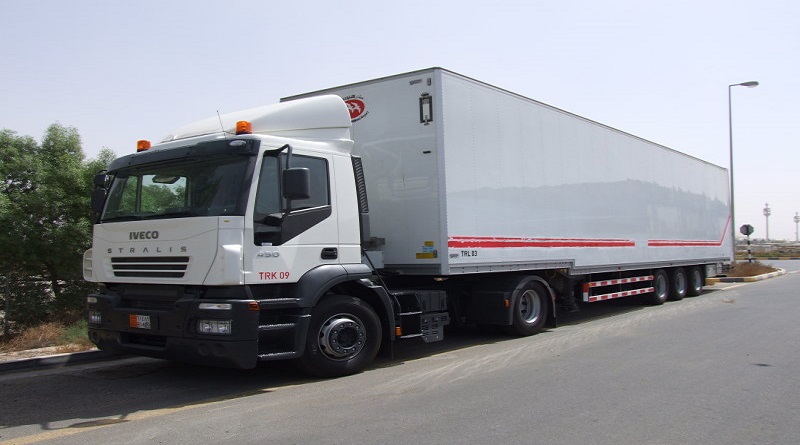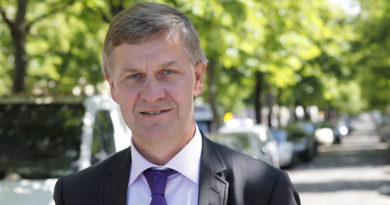Why government, transport companies need to embrace rail transportation- Fashola
Citing frequent damage caused by articulated vehicles moving heavy cargoes across the nation, Nigeria Minister of Power, Works and Housing, Mr. Babatunde Fashola has stressed the need to revert to rail transportation as a means of moving heavy cargo to save the roads.
The Minister said there was need for all the stakeholders including government and all those in the transportation business, especially those in the trailer and tanker business moving cargo across the country, to agree on reverting to the rail transportation as means of moving heavy cargo in order to save the roads.
Recalling that he had in the past suggested to the drivers of articulated vehicles moving heavy cargos to begin to think of alternative means, seeing the damage they cause on the roads, Fashola pointed out that if this was not done in time the roads may collapse and so would their business.
“In the past, I told all the tanker drivers that if they could move from rail transport to tanker and container transport on roads and we have seen the damage we have done, there is no reason we cannot move backâ€, the Minister said adding that although it may take time but there must be a common agreement to move off the roads “because if the roads fail, the transport business diesâ€.
He declared, “So in the same way they import trailers to move their cargo, they can begin to make arrangements to import wagons. We must all agree that this is the way to go. I am convinced that this is the way to go for the futureâ€, adding that Nigerians have even designed tankers beyond the capacity found in any other parts of the world. “We must all agree because this is not sustainableâ€, he said.
Fashola who spoke in Lagos after inspecting ongoing rehabilitation of roads in Apapa, suggested that instead of building and reconstructing the rail-lines, the same containers and tankers could be configured to run on tracks adding, that the present administration was now moving cattle by rail from the North to Lagos and that, according to him, is how it should go to save the roads.
On the rehabilitation project, the Minister, who described it as an emergency intervention, added, “This is why Ijora-Apapa Bridge failed because it was just over burdened with cargo for a very long time and after sometime it could not hold it anymoreâ€.
Explaining his reason for the inspection, the Minister said, “I am here to see things for myself so that those who will give me budgetary support when they ask me for details I can give to themâ€, adding that the project could not be appropriated in the 2016 budget but would be accommodated in the 2017 budget.
According to him, “The Chairman Senate committee on works is someone who is also committed to this project and to finish it. Unfortunately the appropriation did not deal with it this year probably next year in a sense that we give some relief to the people of Apapa and the environs and we hope that as we go on we will be able to revive the old rail tracks even if all it does is to move our cargoâ€. The Ministry of Transportation, he said, is working to revive the rail transportation.
On how the Tin-Can Apapa Bridge and other roads in the area got to its present situation, Fashola, who recalled that Apapa was the nation’s first industrial estate, declared, “You need to understand the history of Apapa itself. This is I believe Nigeria’s first industrial estate; that is what led to the ports in the early twentieth centuryâ€.
“If you go behind the ports you will see all the rail tracks to evacuate cargo from the ports. They were used to evacuate petroleum products from the depots. They go right behind Breweries past Iponri and to Iddo and then out. This is important because when we are seeking to understand what we are doing today or why we are where we are today, we must ask ourselves what we did yesterdayâ€, he said, adding, “It is an important question. Those who don’t want to hear about yesterday have a problem because they won’t understand todayâ€.
Fashola said in pursuing the rail project, there is a lot of inter-ministerial collaboration between his Ministry and that of Transportation adding that the Minister of Transportation, Hon. Chibuike Amaechi, who, according to him, understands the issues more than any other person, would be in a better position to explain the progress being made in the sector.
“Plans will take time to evolve. You will see that his Ministry has delivered the Abuja – Kaduna rail. You see that the Lagos-Kano rail project and all of that were high issues during the budget presentations. I think that all of us now in the Executive and in Parliament are on one page; we are all agreed and there is an understanding of what needs to be doneâ€, he said.
According to the Minister, “There is an appreciation of what is left undone which is what we had done yesterday. Clearly, they have come to haunt us. The analogy is when you go to a doctor to complain of stomach upset, the first question he will ask you is ‘what did you eat yesterday’ and that is where the treatment starts. If he does not get the right diagnosis that means you must go for a scan. If he discovers an intestinal obstruction that means you are going for surgeryâ€.
“So what we did yesterday is important in understanding what we must do today. Across the sectors and in all the places where we should have built, contractors were not paid for two to three years. We were coordinating and managing the economy and making budgetsâ€, he said.
Blaming the present economic recession on the profligacy of the previous administrations, Fashola declared, “So that is what we did yesterday; so when you hear recession, workers were laid off, they were not paid and they couldn’t pay school fees. While we were buying and selling, contractors were staying at home. So what you see now is a result of what we ate yesterday. So we must just change that diet and fund contractorsâ€.
Concerning the Apapa-Tin Can Bridge, the Minister, who said he had no appropriation this year for the bridge, however, assured that if appropriation would be available next year, the Bridge would be funded adding, “It is a six-month job done in dry weather and this should be behind usâ€.
Asked if there would be a review of the contract costs given the rising cost of construction materials, Fashola said there was need for the entire stakeholders in the industry to adjust because of the prevailing difficult times. He declared, “As for the contractors and any prospect of project review, I think people have to adjust their expectations. It is a difficult time and we all must join hands to build this economyâ€.
Earlier, while conducting the Minister round the project, the Acting Federal Controller of Works in Lagos, Engr.(Mrs) Osareme Osakue said the contract which scope of work included the construction of an ultra-modern Truck Terminal with offices and police posts; construction of new carriageway between Liverpool Bridge and Tin Can Second Gate among other facilities meant to ease the flow of traffic in the Apapa Ports area was first awarded on 18th November 2009 to Messrs Borini Prono (Nig.) Ltd but had not been completed due to lack of budgetary provision to pay for executed works.
Speaking with the journalists during a second stop over to inspect the emergency repair work carried out on the Apapa-Ijora bridge by Julius Berger Nigeria Plc, the Minister expressed gratitude to commuters and motorists, who, he said, have had to detour from their normal routes and had also shown commendable understanding, adding that it was on that basis that the contractors have been able to intervene and respond at the bridge.
“The second thing to say here is to publicly express gratitude to Messrs Julius Berger because even at this moment they don’t have a contract on this bridge. They have done this solely on a letter of authorization to go and stabilize the place. I want to thank them publicly. This is the kind of patriotic disposition the economy needs to bring it back because it then enables us to demonstrate our capacities in times of emergenciesâ€, he said.
The Minister, who said government was going through detailed scope of what needs to be done on the bridge, pointed out that what was being done at the moment was a temporary intervention adding, “That is why it is limited traffic that can pass here. We don’t want an accident here; we don’t want a disaster here while we are re-scoping the engineering work that needs to be doneâ€.
Pointing out that the expansion joints on the bridge have not been changed for a long time, Fashola explained further, “So that is what we are trying to see how we can change all that†adding that all the light fittings that came with the bridge which had all gone would be brought back to improve the security of the area and also the commuter experience.
“We are waiting for the final details and hoping that we would have it in good enough time so that we can then make appropriation for it in the next budget for them to start the work in full speed next yearâ€, the Minister said adding that efforts were also being made to get the structural drawing to enable the contractors know how to proceed.
The Minister, who said the contractor that built the bridge could not be reached, explained that the present contractors would need the drawing to know all the parts and joints where they need to change adding, “As soon as we get the drawings there is nothing that cannot be done. But I don’t think that is what should delay us. I am sure the contractors want to start work in full swingâ€.




